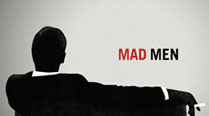Opinion Juvenile pleasures
American TV shows tell us that adulthood as we have known it has become conceptually untenable.

By A O Scott
TV characters are among the allegorical figures of our age, giving individual human shape to our collective anxieties and aspirations. The meanings of Mad Men are not very mysterious: The title of the final half season, which airs next spring, will be ‘‘The End of an Era’’. The most obvious thing about the series’s meticulous, revisionist, present-minded depiction of the past, and for many viewers the most pleasurable, is that it shows an old order collapsing under the weight of internal contradiction and external pressure. From the start, Mad Men has, in addition to cataloging bygone vices and fashion choices, traced the erosion, the gradual slide towards obsolescence, of a power structure built on and in service of the prerogatives of white men. The unthinking way Don, Pete, Roger and the rest of them enjoy their position, and the ease with which they abuse it, inspires what has become a familiar kind of ambivalence among cable viewers.
Weren’t those guys awful, back then? But weren’t they also kind of cool? We are invited to have our outrage and eat our nostalgia too, to applaud the show’s right-thinking critique of what we love it for glamourising.
The widespread hunch that Mad Men will end with its hero’s death is what you might call overdetermined. It does not arise only from the internal logic of the narrative itself, but is also a product of cultural expectations. Something profound has been happening in our television over the past decade, some end-stage reckoning. It is the era not just of mad men, but also of sad men and, above all, bad men. Don is at once the heir and precursor to Tony Soprano, that avatar of masculine entitlement who fended off threats to the alpha-dog status he had inherited and worked hard to maintain. Walter White, the protagonist of Breaking Bad, struggled, early on, with his own emasculation and then triumphantly (and sociopathically) reasserted the mastery that the world had contrived to deny him. The monstrousness of these men was inseparable from their charisma, and sometimes it was hard to tell if we were supposed to be rooting for them or recoiling in horror.
We were invited to participate in their self-delusions and to see through them, to marvel at the mask of masculine competence even as we watched it slip or turn ugly. Their deaths were (and will be) a culmination and a conclusion: Tony, Walter and Don are the last of the patriarchs.
In suggesting that patriarchy is dead, I am not claiming that sexism is finished, that men are obsolete or that the triumph of feminism is at hand. I may be a middle-aged white man, but I’m not an idiot. In the world of politics, work and family, misogyny is a stubborn fact of life. But in the universe of thoughts and words, there is more conviction and intelligence in the critique of male privilege than in its defence, which tends to be panicky and halfhearted when it is not obtuse and obnoxious. The supremacy of men can no longer be taken as a reflection of natural order or settled custom.
This slow unwinding has been the work of generations. For the most part, it has been understood — rightly in my view, and this is not really an argument I want to have right now — as a narrative of progress. A society that was exclusive and repressive is now freer and more open. But there may be other less unequivocally happy consequences. It seems that, in doing away with patriarchal authority, we have also, perhaps unwittingly, killed off all the grown-ups.
A little over a week after the conclusion of the first half of the last Mad Men season, the journalist and critic Ruth Graham published a polemical essay in Slate lamenting the popularity of young-adult fiction among fully adult readers. It was not an argument she was in a position to win, however persuasive her points. To oppose the juvenile pleasures of empowered cultural consumers is to assume, wittingly or not, the role of scold, snob or curmudgeon. My point is not so much to defend such responses as to acknowledge how absurd, how impotent, how out of touch they will inevitably sound. Comic-book movies, family-friendly animated adventures, tales of adolescent heroism and comedies of arrested development do not only make up the commercial centre of 21st-century Hollywood. They are its artistic heart.
Meanwhile, television has made it very clear that we are at a frontier. Not only have shows like The Sopranos and Mad Men heralded the end of male authority; we’ve also witnessed the erosion of traditional adulthood in any form, at least as it used to be portrayed in the formerly tried-and-true genres of the urban cop show, the living-room or workplace sitcom and the prime-time soap opera. Instead, we are now in the age of Girls, Broad City, Masters of Sex (a prehistory of the end of patriarchy), Bob’s Burgers (a loopy post-Simpsons family cartoon) and a flood of goofy, sweet, self-indulgent and obnoxious improve-based web videos.
What all of these shows grasp at, in one way or another, is that nobody knows how to be a grown-up anymore. Adulthood as we have known it has become conceptually untenable. It isn’t only that patriarchy in the strict, old-school Don Draper sense has fallen apart. It’s that it may never really have existed in the first place, at least in the way its avatars imagined.


